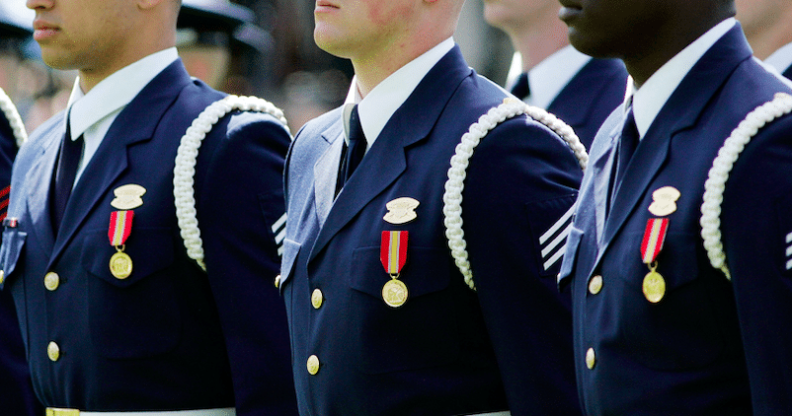After 36 long years, a transgender veteran has finally been granted the honourable discharge she deserves

Transgender veteran Kelly Roser carried the shame of her discharge for decades (Tim Graham/Getty)
The US airforce has finally granted an honourable discharge to a trans veteran whose life was marred by mental illness, homelessness, unemployment and drug use.
In 1984 Kelly Katherine Roser’s exemplary military career was upended by a one-time positive drug test for marijuana, which she used as a form of self-medication for the distress of her gender dysphoria.
For years she battled with the shame of her discharge, until now. At 59 years old, Roser has finally received the full honours she earned.
“Soldiers don’t fight for the flag or the Constitution – they fight for other soldiers. When you let them down, it is the worst feeling in the world,” she told the Daily News.
“Even with an honourable discharge, I may have failed at life but I am worthy to stand in their ranks.”
Roser struggled with her gender identity from the age of 13, but was unable to articulate her feelings. “I wanted to scream that I was a woman,” she said, “but the only answer I had was that I wanted to join the Air Force to make me a man. That didn’t quite turn out as expected.”
In her search for a sense of belonging Roser enlisted in the military in 1977. She was quickly promoted to the rank of staff sergeant, but still couldn’t shake the feeling there was something wrong inside.
As her emotional problems began to surface she was belittled by lower ranks and disrespected by her peers. She became prone to mental outbursts, which were met with “confusion and laughter” by her fellow airmen.
A psychiatric evaluation determined no problems and made no mention of gender dysphoria, which wasn’t commonly diagnosed at the time. Roser was unable to reach her full potential because the Air Force entirely missed the reason for her deteriorating mental state, her attorneys say.
“It is no surprise that Ms Roser’s mental health problems continued until they reached a breaking point,” they said in their legal brief, as seen by the Daily News. “This happened time and time again, and the end result was always the same.”
Trans veteran Kelly Katherine Roser: ‘When I got my general discharge my life was over.’
To cope, trans veteran Roser self-medicated with alcohol and, in her private quarters on base, cross-dressed and smoked marijuana.
“When I got my general discharge my life was over,” said Roser, who now struggles with vivid nightmares, bipolar depression and PTSD. “I wish I could have had a military career but, if I couldn’t have been a female, it would have been destructive.”
Her trauma only continued after she left the Air Force. Her emotional outbursts caused her to be fired from more than two dozen jobs, and she attempted suicide three times.
The pressure only eased when she transitioned in 2012. Now after decades of struggle, the final burden of her military discharge has also been lifted.
“We as a society still have a long way to go to recognise the harm caused when the military, or any institution, excludes or retaliates against people for their sexual orientation or gender identity,” said senior attorney Paula Clamurro, who assisted in Roser’s appeal.
“For this case, the military can no longer degrade a person for their devotion and desire to serve this country. She finally received the full honours she earned.”

